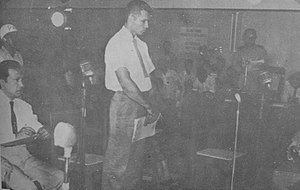Allen Lawrence Pope
| Allen Lawrence Pope | |
|---|---|

Allen Pope on trial in Jakarta, 28 December 1959
|
|
| Allegiance | United States |
| Service/branch |
|
| Rank | First lieutenant |
| Battles/wars |
Korean War First Indochina War Permesta rebellion |
| Awards |
Légion d'honneur |
| Other work | Flight instructor |
Allen Lawrence Pope (born 1928 or 1929) is a retired US military and paramilitary aviator. He rose to international attention as the subject of a diplomatic dispute between the United States and Indonesia after the B-26 Invader aircraft he was piloting in a Central Intelligence Agency (CIA) covert operation was shot down over Ambon in May 1958 during the "Indonesian crisis".
Pope's aviation career began with the United States Air Force, serving with distinction flying bombing missions in the Korean War. He transferred to the CIA in 1954, which he also served with distinction flying transport missions in the First Indochina War.
In the Permesta rebellion in Indonesia in 1958, Pope again flew bombing missions for the CIA. Shot down by government forces, he was captured and held under house arrest for just over four years. In 1960, an Indonesian court condemned him to death, but considerable back-channel negotiations led to his release by President Sukarno in 1962. Pope returned to the United States and subsequently flew CIA covert missions in other theaters.
A native of Miami,Florida, and graduate of the University of Florida, Pope is now retired and lives in the United States. In 2005, France made him a Chevalier de la Légion d'honneur for his service in Indochina.
After university, Pope entered the U.S. Air Force and served as a first lieutenant in the Korean War. He flew a Douglas B-26 Invader in combat, receiving three Air Medals and a Distinguished Flying Cross. After the war, the U.S. Air Force returned Pope to the United States as an Air Force instructor.
...
Wikipedia
